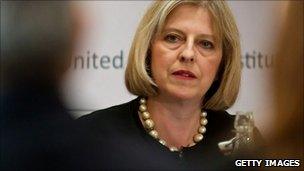Measures to prevent violent extremism come under review
- Published

Theresa May: Wide-ranging review
A review of policies to prevent extremism will look at prisons, universities and mosques, the Home Secretary has announced.
Theresa May said Lord Carlile, the outgoing terror laws watchdog, would look at the policies launched in the wake of the 7/7 London attacks.
Ministers say a review is needed as the policies are not working as well as they could.
Mrs May also named David Anderson QC as the new reviewer of terrorism laws.
Lord Carlile's last task as the outgoing watchdog would be to look at the arrests and subsequent release of six men under terrorism laws during the Pope's visit to the UK.
The government's policy to prevent violent extremism, commonly known as Prevent, is a key plank of the wider counter-terrorism strategy.
Announcing the review, Mrs May said in a written ministerial statement that there was no question that the UK needed to take steps to deal with the causes as well as the symptoms of terrorism.
But she added: "We want to avoid the mistakes of the previous government. The new Prevent strategy will follow the principles of our counter-terrorism legislation.
"It will be proportionate to the specific challenge we face; it will only do what is necessary to achieve its specific aims; and it will be more effective."
The review is expected to focus on a number of key areas including work in prisons, universities and how best to enlist Muslim community organisations, such as mosques. It will also look at the role of the police and other bodies.
Lord Carlile will also be asked to look at how domestic Prevent strategies can be joined up with counter-terrorism work overseas.
Mrs May also said that the government's revised Prevent programmes would be separated from work on community cohesion and integration undertaken by the Department for Communities and Local Government.
'Stigmatising' claims
In a report, external last March, the cross-party Communities and Local Government Committee attacked the former government's approach, saying Prevent had stigmatised and alienated Muslims.
The MPs said that the politices had tainted many local projects that would have been otherwise seen as playing an important role in strengthening communities.
In her first speech on counter-terrorism last week, Mrs May echoed that concern when she pledged that the coalition government would not "securitise our integration strategy", adding there had to be a new dialogue and relationship between government and Muslim communities.
At the same time, there has been a growing debate in higher education over how to prevent extremists grooming potential recruits on university campuses - although the exact nature of the threat has so far proved difficult to quantify.
Lord Carlile, a Liberal Democrat peer, has been the terrorism laws watchdog since 2005, producing annual reports on the workings of the most controversial aspects. He will be succeeded by David Anderson in the new year.
Mr Anderson is a specialist barrister in European Union, public and human rights law and has been a QC for more than a decade.
He is also a visiting professor of law at King's College London. He recently represented an alleged supporter of al-Qaeda in a case challenging European asset-freezing measures, external.
- Published9 November 2010
- Published19 September 2010